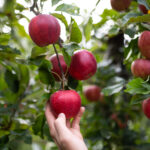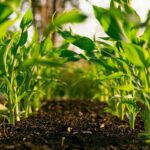Organic farming: Philosophy, contamination and fertilizers

The content of this article was published by WikiFarmer. It has been split into two parts - click here to read the first part.
The general philosophy of organic farming
As a general philosophy, the potential organic farmer needs to fully understand the concept of a closed natural ecosystem (with minimum inputs and outputs) and try to use first all the healthy ingredients that already exist in the ecosystem. By this, we mean that the organic farm is treated as a separate ecosystem where there are very few inputs and outputs, and most elements are recycled within this farm, ensuring sustainability.
For example, let’s assume that we manage an organic olive tree orchard. After pruning, rather than removing cut branches or burning them (as is usually the case in conventional farming), organic farmers crush them with special machinery, decimate the branches of the tree and deposit the sawdust on the soil.
This has beneficial effects, as it has been calculated that for every 1000 kg of olive wood (with 50% moisture) incorporated into the soil, 4 kg of nitrogen, 0.5 kg of phosphorus, 4 kg of potassium, 5 kg of calcium and 1 kg of magnesium are added to it (Amirante. Et al., 2002).
This reduces the need for additional chemical fertilizers, the majority of which is not allowed in organic farming. In this way, we have the least possible inputs and outputs and promote the recycling of the elements within the olive orchard. There are, of course, cases in which tree branches must be removed immediately from an organic orchard, for example when a tree tissue suffers from a pest or a disease.
Understanding and Preventing Contamination
Some practices applied to the surrounding fields may cause contamination of our organic farm. For example, the organic farm can be polluted if our neighbor is a conventional farmer and applies some spraying pesticides during a windy day. However, contamination does not occur only from pesticides.
Even during pruning or harvesting, there is an increased risk of contaminating the soil or a water source by simply using a machine (e.g. a machine oil leak). Farmers should carefully consider the risks that can cause contamination of an organic farm and take the proper measures.
In order to avoid the risks of pesticide contamination from a neighboring farm, farmers may, for example, consider using natural hedge plants. Planting such type of plants gives the farmer the opportunity to create a protected area and reduce the risks of pesticide contamination through the wind. Furthermore, a farmer could divert run-off water. This method will reduce the risks of pesticide contamination through run-off water.
GMOs are also a contaminating factor when it comes to organic farming. It is very important to examine the crop history of the fields that are intended for organic farming. Prospective fields for organic farming should have crop history free from GMOs.
Farmers may also consider using untreated seeds. Moreover, seeds should be bought from a trader who is not involved in GM production. Finally, all cultivation and harvesting tools, as well as all the transport and storage facilities that are used in organic farming shall not be used by conventional farmers, οtherwise we increase the risk of contamination. However, these are just some common practices that should not be followed without making your own research.
You may seek advice from your local authority and your certification partner.
Fertilizers in Organic farming
The majority of the chemical fertilizers (for example, mineral nitrogen fertilizers) are not allowed in organic farming. The only fertilizers allowed are those that have been approved for use in organic farming.
Proper soil fertility, however, is vital for plant growth. Mostly nitrogen, but also phosphorus and potassium are essential elements during the vegetative growth stages of the plant. Since conventional fertilizers are not allowed, some of the best organic fertilizers are:
Green Manure
Green manure production begins with the sowing of an annual or perennial plant (alfalfa, vetch) in the field. This method improves soil fertility and soil structure. It increases water absorption and soil moisture. This method is also applied as a weed control method. Nitrogen-fixing plants, such as alfalfa, creeping clover, broad beans, lupine, pea, chickpea, etc. are used extensively for that reason. Cereals, such as oats and barley are also used.
These plants (especially legumes) absorb significant amounts of nutrients. Incorporated into the soil, nutrients will be released into the soil and made available for succeeding crops.) If the producer decides to use this technique, it is necessary to use propagating material (seeds) that does not belong to the category of Genetically Modified Organisms.
Compost
Composting is a natural process in which specific groups of microorganisms, such as bacteria, convert organic substances into humus. After the processing is finished, compost is produced. Compost consists of a mixture of organic matter, nutrients, and trace elements. It is a way of natural fertilization with excellent soil-enhancing properties. However, you should consult your local licensed agronomist before applying compost.
Manure
Another way of organic fertilization is to use manure. Animal manure from organic farms is commonly used. The manure should be well rotted and can be applied around the plants. However, you should consult your local licensed agronomist before applying manure. Other farmers cover the soil surface with dead plant material in order to improve soil fertility and control weeds. This method is known as mulching.
Hydroponic production is not normally permitted. Hydroponics is the method according to which producers do not use soil in order to grow their plants. Instead, they use an inert medium enriched with nutrient solutions, where they place their plants’ roots. According to the authorities of most countries, organic crops shall be grown in living soil. However, United States authorities have recently allowed some hydroponic farms to label their products as organic.
Crop protection and Weed Control in Organic Farming – Organic Pests and Diseases Management
In organic farming, the majority of chemical pesticides, fungicides, herbicides, etc. are not allowed, unless they have been authorized for use in organic farming. Ecological approaches may prevent pest and disease outbreaks.
The prevention of any damage caused by pests, diseases or weeds is primarily based on
- The use of natural enemies (for example ladybugs)
- The selection of resistant species and varieties
- Crop rotation
- Proper cultivation techniques, such as proper pruning when it comes to tree cultivation.
- Sowing of certain plants (for example vetch) between our main crop. Some plants (like vetch and some Trifolium species) are famous for naturally suppressing weed growth.
Moreover, farmers can choose sowing times that prevent pest outbreaks and improve soil health. Disease-free seeds and planting materials are also necessary. Generally, organic farmers are recommended to choose local seeds or species, which perform well in local conditions.
Conclusion: To be or not to be (Organic)?
The decision on choosing organic versus conventional farming is not easy, either from an environmental or a financial perspective. Some farmers choose organic farming because it fits well with their philosophy of producing natural products.
However, a great proportion of organic farmers have made their choice after calculating prices, revenues, and expenses. It is for sure that some farmers cannot compete in cost. Their acreage may be small enough or they may not have the experience to control all the costs and produce an average product at an attractive price. Thus, many farmers choose organic farming, as they bet on quality.
They plan to produce a small quantity of a high-quality product that can be sold at very high prices. Some of them are successful in this, while others are not. In any case, organic farming requires extensive research, special handling, training, guidance, and some level of experience in order to be successful








































